The Benthin Family is a film of genre Drama directed by Kurt Maetzig with Maly Delschaft
The Benthin Family (1950)
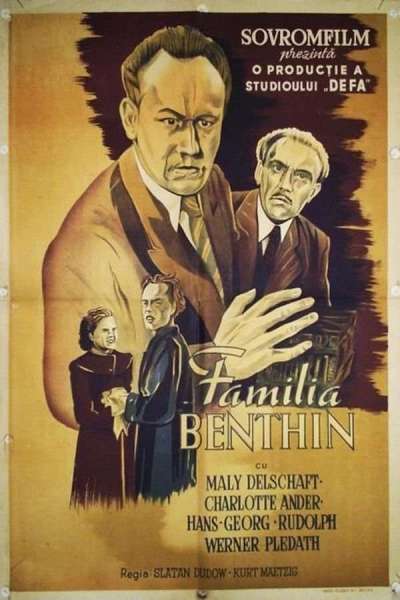
If you like this film, let us know!
Familie Benthin is an East German film. It was released in 1950.
Synopsis
Theo and Gustav Benthin are two brothers who operate a smuggling network: Theo, a factory director in East Germany, illegally transfers goods to his brother on the other side of the border, and the latter sells them in West Germany. The two also employ another pair of brothers, Peter and Klaus Naumann. Theo is caught by the People's Police; Gustav cannot compete in the wild capitalist market without the cheap merchandise from the East and his business collapses. Peter Naumann moves to the Federal Republic, but there he finds only unemployment and is eventually to join the French Foreign Legion. Klaus remains in the East and finds a promising job as a steel worker.Actors
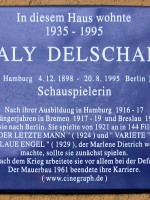
Maly Delschaft
(Annemarie Naumann)

Werner Pledath
(Gustav Benthin)

Ottokar Runze
(Peter Naumann)

Erik Schumann
(Hans Bodmer)

Konrad Petzold
(FDJler)
Comments
Leave comment :
Suggestions of similar film to The Benthin Family
There are 21 films with the same actors, 24 films with the same director, 61504 with the same cinematographic genres, to have finally 70 suggestions of similar films.If you liked The Benthin Family, you will probably like those similar films :
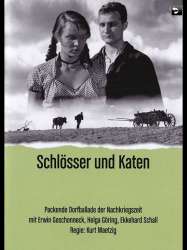
Castles and Cottages (1957)
, 3h23Directed by Kurt Maetzig
Genres Drama
Actors Raimund Schelcher, Erika Dunkelmann, Erwin Geschonneck, Helga Göring, Hans Finohr, Ulrich Thein
Rating67%





In a feudal estate in Mecklenburg, the hunchback coachman Anton Zuckman married maid Marthe, who was pregnant with Baron von Holzendorf's illegitimate child, in exchange for a letter promising that the baron would recognize his offspring when it would wed and endow it with 5000 Mark. Marthe gave birth to a daughter, Anna, nicknamed Annegret.

Directed by Slátan Dudow
Genres Drama
Themes Political films
Actors Ernst Busch, Hertha Thiele, Adolf Fischer, Gerhard Bienert, Anna Müller-Lincke, Erwin Geschonneck
Rating65%





Kuhle Wampe takes place in early-1930s Berlin. The film begins with a montage of newspaper headlines describing steadily-rising unemployment figures. This is followed by scenes of a young man looking for work in the city and the family discussing the unpaid back rent. The young man, brother of the protagonist Anni, removes his wristwatch and throws himself from a window out of despair. Shortly thereafter his family is evicted from their apartment. Now homeless, the family moves into a garden colony of sorts with the name “Kuhle Wampe.”

Our Daily Bread (1949)
Directed by Slátan Dudow
Genres Drama
Actors Paul Bildt, Paul Edwin Roth, Erna Sellmer, Friedrich Gnaß, Herbert Weißbach, Erich Dunskus
Rating67%





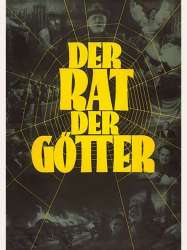
Council of the Gods (1950)
, 1h50Directed by Kurt Maetzig
Origin German
Genres Drama
Actors Paul Bildt, Fritz Tillmann, Inge Keller, Agnes Windeck, Brigitte Krause, Arthur Wiesner
Rating65%





In the early 1930s, Dr. Scholz is a chemist working for IG Farben. While he develops new types of rocket fuel and a gas which he believes to be a pesticide, his corporate superiors support Adolf Hitler in his quest to dominate Germany, and subsequently, the whole of Europe. Director General Mauch and his fellow managers, who jokingly call themselves 'the council of the gods', are cleverly using the Second World War to earn a fortune, by supplying the Third Reich and - through their cartel with Standard Oil - the Western Allies. Scholz, fearing to lose his position, turns a blind eye even as he realizes what the gas he developed is used for. Throughout the war, American bombers do not destroy IG Farben plants, as they are pressured by the company's associates in the United States to leave its infrastructure intact. After the war ends, the Americans acquit most of the directors from charges of crimes against humanity and secretly use their experience to produce chemical weapons, that would be deployed against the Soviet Union. After an explosion in a chemical factory kills hundreds, Scholz - who is now a communist - cannot remain silent. He publicizes the truth about IG Farben's wartime activity, warning that they plan yet another to make more money. An immense demonstration takes place outside the firm's headquarters. The American general supervising the managers proposes to disperse them with tanks, but Mauch refuses, fearing the crowd's reaction. The demonstration turns into a May Day rally.

Destinies of Women (1952)
Directed by Slátan Dudow
Genres Drama
Actors Sonja Sutter, Maly Delschaft, Friedrich Gnaß, Friedrich Kühne, Gertrud Meyen, Edith Volkmann
Rating64%






Story of a Young Couple (1952)
, 1h44Directed by Kurt Maetzig
Genres Drama
Actors Martin Hellberg, Hilde Sessak, Brigitte Krause, Friedrich Gnaß, Theo Shall, Robert Trösch
Rating57%





Agnes and Jochen are two young actors who meet and fall in love while appearing in a Berlin production of Nathan the Wise. After the two marry, Agnes is drawn to the communist cause, and begins acting in East German films, which her husband views as sheer propaganda, especially when she recites a poem praising Stalin. When Jochen decides to accept a role in Les Mains Sales, his wife cannot bring herself to follow him, viewing the play as seditious. They decide to divorce. Jochen becomes a celebrated star in the West, but slowly realizes that not all is well: he sees that former influential Nazis are rehabilitated. After witnessing an anti-war demonstration brutally dispersed by the police, he arrives in the divorce court and asks Agnes to reconcile with him. The two reunite and move to East Berlin.
 , 2h4
, 2h4Directed by Kurt Maetzig, Konrad Wolf
Genres Drama, Biography, Historical
Themes Politique, Political films
Actors Günther Simon, Wolf Kaiser, Werner Peters, Raimund Schelcher, Erika Dunkelmann, Nikolai Kryuchkov
Rating62%





After fellow soldier Johannes Harms reports that a revolution has broken out at home, Thälmann - who leads a revolutionary cell on the Western Front - and his friend Fiete Jansen rebel against their officers, Zinker and Quadde, and desert. Harms dies in a shelling. In Berlin, the American capitalist Mr. McFuller demands to crush the Spartacists. Zinker, now a member of the Freikorps, murders Karl Liebknecht and Rosa Luxemburg. Thälmann hears of it and promises their sacrifice will not be in vain. Jansen falls in love with Harms' daughter, Änne.
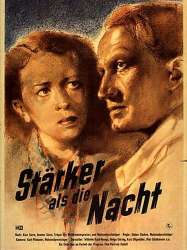
Stronger Than the Night (1954)
Directed by Slátan Dudow
Genres Drama, Historical
Actors Helga Göring, Erika Dunkelmann, Gustav Püttjer, Theo Shall, Werner Finck
Rating63%






Marriage in the Shadows (1947)
, 1h44Directed by Kurt Maetzig
Genres Drama
Themes Films about religion, Political films, Films about Jews and Judaism
Actors Ilse Steppat, Claus Holm, Hans Leibelt, Karl Hellmer, Willy Prager
Rating71%





Actor Hans Wieland refuses to divorce his actress wife, Elisabeth, who is Jewish, even as extreme pressure is applied on him by the Nazi authorities. He even takes her to a premiere of one of his films where she is unwittingly introduced to a high Nazi Party official. Upon later discovering that the charming woman at the premiere was in fact Jewish, he orders her arrest. Hans Wieland is given an ultimatum by his former friend Herbert Blohm, now a Nazi official at the Reichskulturministerium (culture ministry), to save himself by divorcing his wife. Knowing that his wife will die in a concentration camp, Hans Wieland returns home and they drink poison in coffee whilst reciting the closing scene of Friedrich Schiller's tragic play Kabale und Liebe together.
 , 1h26
, 1h26Directed by Kurt Maetzig
Genres Drama, Comedy
Actors Erna Sellmer, Sabine Thalbach, Günther Simon, Manfred Krug, Katharina Matz
Rating63%





Traudel is a war orphan, whose mother had died in the Ravensbrück concentration camp after refusing to renounce her love for a Czechoslovak prisoner. The only remnant the daughter has from her mother is a letter ending with the words "don't forget me, my little Traudel". When she turns seventeen, she flees the orphanage and ventures to Berlin, where she meets policeman Hannes, who falls in love with her and even forges documents for her. He is caught, but is only slightly reprimanded, and marries her.
 Connection
Connection